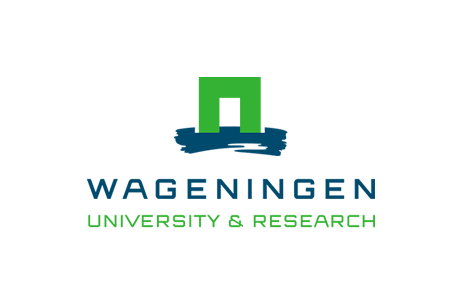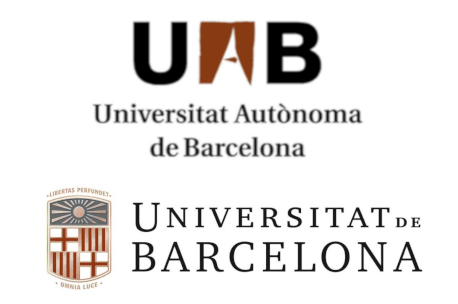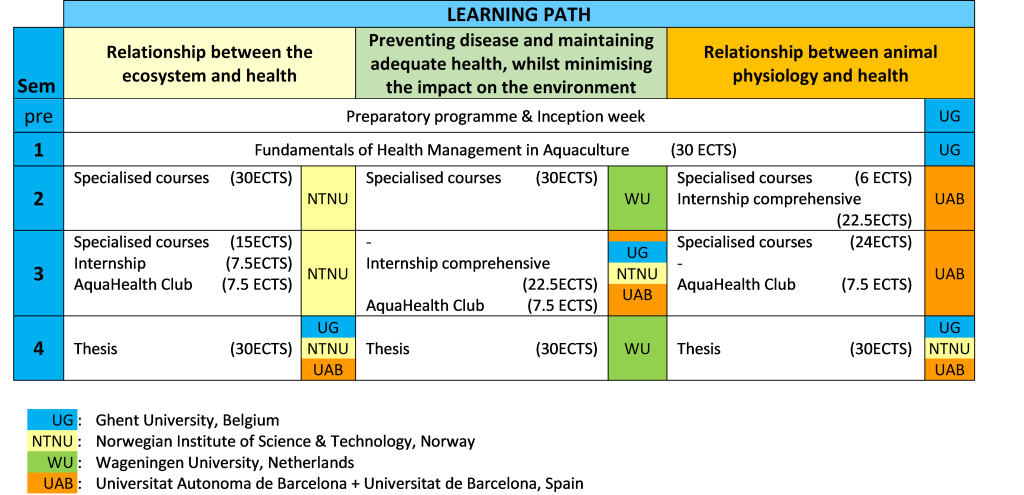Objectives of the programme
The aquaculture sector has seen a massive increase in production over the past 35 years thanks to major technological and biotechnological advances. The ever-continuing intensification in aquaculture systems, along with an increased production scale has, however, inevitably resulted in the increased occurrence of disease outbreaks. This has created a high need for aquaculture health management experts that can respond to the growing demand for solution to health challenges in the aquaculture industry and contribute to a growing, innovative sector that is key to the world’s food needs.
Structure of the course
The programme consists of an initial common semester that is carried out at Ghent University, then in the 2nd and 3rd semester students can choose* between 3 learning paths that will deepen their knowledge on a specific aspect of the overarching programme theme.
Curriculum and course details: check the study guides
* chosen learning paths may have to be redistributed to maintain balance among the learning paths per student cohort
Our learning paths

The Norwegian University of Science and Technology
Delivers a focus on the relationship between the ecosystem and health

Wageningen University
Delivers a focus on preventing disease and maintaining adequate health, whilst minimising the impact on the environment

Universitat Autònoma de Barcelona &
Universitat de Barcelona
Delivers a focus on the relationship between animal physiology and health
In the 2nd or 3rd semester, students will undertake an internship with a company or research institute among our extended international network of partners and contacts. The internship is a practically oriented scientific project where they will gain the skills and knowledge that will prepare them for the labour market.
Finally, in the 4th semester a master dissertation or thesis is undertaken that will combine a students acquired skill and knowledge.
Semesters
Semester 1 – Ghent University, Belgium
The semester provides a thorough foundation on the current landscape of aquatic immunology, virology, microbiology, and other essential disciplines and is taught using a combination of in-house academic expertise and renowned international guest lecturers.
Semester 2 & 3 : choose between 3 learning paths
- Semester 2 & 3 – NTNU
- Semester 2 & 3 – WU
- Semester 2 & 3 – UAB / UB
Semester 2 & 3 – NTNU
Ecosystems and Health at The Norwegian University of Science and Technology (NTNU), Norway.
The path focuses on the importance of the interactions between farmed and native organisms, including how diseases and parasites are spread (salmon lice); interactions between native microbial communities and farmed hosts; the influence of water quality (e.g. toxic algae) on the health and welfare of farmed fish. The overall focus is normally on how the environment, or the ecosystem, may affect fish health, not on the effects of farming on the environment. Learning activities mainly include health, welfare and environmental issues for fish from larval to adult stages. NTNU currently has major involvements in research on health issues in marine fish farming and has a strong relationship with industry.
Semester 2
Semester 3
| Course | ECTS |
|---|---|
| Internship project | 7.5 |
| AquaH Journal club | 7.5 |
| Aquaculture and the Ecosystem | 7.5 |
| Optional courses (choose for 7,5 ECTS) | |
| Laboratory Animal Science for Researchers | 7.5 |
| Environmental assessment methods and quality of coastal water | 7.5 |
| 37.5 |
Semester 2 & 3 – WU
Disease Prevention Management & Health at Wageningen University (WU), Netherlands.
The path focuses on relevant innovations by studying fish and shellfish nutrition and health. This is mainly in circular aquaculture systems, be it in recirculating aquaculture systems or ponds. Research looks into how nutrition influences health and how novel feeds improve disease resistance; it also considers the latest strategies in terms of activation of the immune system and key therapeutic tools, such as new generation vaccines.
Semester 2
Semester 3
| Course | ECTS |
|---|---|
| Internship comprehensive project | 22.5 |
| AquaHealth Journal club | 7.5 |
| 30 |
Semester 2 & 3 – UAB / UB
Physiology and Health at Universitat Autònoma de Barcelona and Universitat de Barcelona (UAB/UB), Spain.
The path focuses on giving students the opportunity to acquire knowledge on the physiological mechanisms involved in the overall health of fish and shellfish. Within this, the following aspects will be considered: harmonious growth and balanced nutrition; the generation of the stress response and stress prevention methodologies; the innate and adaptive mechanisms of immune defences; the regulatory systems involved; knowledge of infections; pathological signs; and the patho-physiological response.

